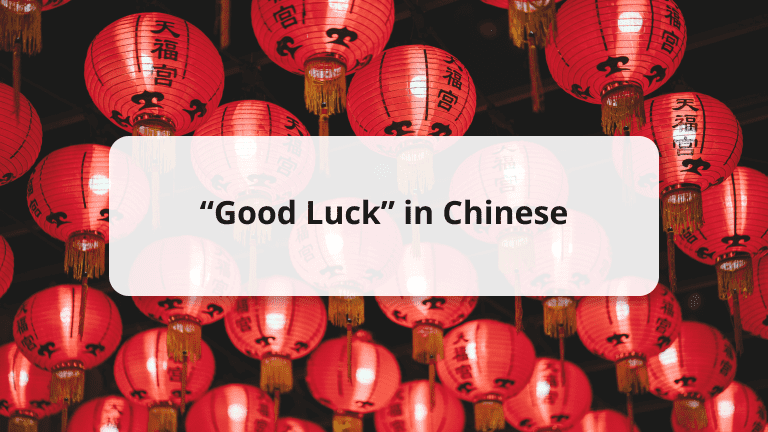Knowing how to say good luck in Chinese can benefit you in many ways. This can be useful when attending a holiday party, a wedding, or any other social event. Most importantly, it can be essential when having a conversation in Chinese.
Besides teaching you how to say “good luck” in Chinese, this article will equip you with a wide asset of Chinese blessings to give others. Not only to cheer people up, but also some phrases to use on major holidays according to Chinese culture. If interested, don’t forget to also check out ‘Chinese expressions’ to learn more about basic Chinese phrases and their meanings!
How to Say “Good Luck” in Chinese
Just as in Western culture, Chinese people wish others luck in upcoming events of their lives. When saying ‘good luck’ to someone in Chinese, you may use the following phrases:
Wish you good luck – 祝你好运 (zhù nǐ hǎo yùn)
This is the literal translation of “wish you good luck”. One thing to be aware of, is that in Chinese culture, this phrase is often used on occasions that really depend on luck (such as the lottery). In other occasions, there are many other ways to wish someone good luck.
我来祝你好运,今晚 (Wǒ lái zhù nǐ hǎo yùn, jīn wǎn) – I came to wish you luck tonight.

Good Luck in Chinese: Daily Situations
On daily occasions, instead of directly wishing someone “good luck”, in Chinese it’s more common to wish people to “reach their fullest potential”. Therefore, when a person is about to face a challenging event in his or her life, here are some useful phrases for you to cheer him or her up:
Good luck/Do your best! – 加油 (jīa yóu):
The phrase 加油 (jīayóu) literally means “add oil”. It originates from ancient China, when a governor helped add oil to the oil lamps of those who stayed up until late to study, encouraging them to get good grades. This is the most commonly used phrase in the Chinese speaking world to encourage someone.
加油 !你昨天跳得比这远 (Jiāyóu nǐ zuótiān tiào dé bǐ zhè yuǎn) – Come on! You jumped further than this yesterday.
Do your best! – 好好儿干啊 (hǎo hǎor gàn ‘a)
This is another way to encourage people to do their best. The direct translation of this phrase is “do it well”.
This phrase is more of an imperative sentence, so while it is ok to use it with your friends or someone who is younger than you, make sure to keep in mind that it is inappropriate to use this phrase with elder people or those who in higher social hierarchy than you.
你现在即来了,就得好好儿干,让我们脸上也光彩 (Nǐ xiànzài jí láile, jiù dé hǎohǎo er gàn, ràng wǒmen liǎn shàng yě guāngcǎi) – Now you’ve come, you did your best, and be a credit to us.
You can do it! – 你可以的 (nǐ kě yǐ ‘de)
Also a commonly used phrase. Similar usage to the direct English translation, you can use this phrase to encourage people to believe that they can do it. The literal translation of the phrase is “you can”.
恭喜 我就知道你可以的 (Gōngxǐ wǒ jiù zhīdào nǐ kěyǐ de) – Congratulations! I knew you could do it!
These phrases can also be used together, for example:
- 加油!好好儿干啊!我相信你可以的!(Jīa yóu! hǎo hǎor gàn ‘a! wǒ xīang xìn nǐ kě yǐ ‘de)
- Good luck, do your best! I believe you can do it.

Good Luck in Chinese: Birthday Wishes
There are certain phrases that are used in birthday wishes to wish the birthday person good luck in Mandarine! You can use these phrases on birthday cards, texts, or tweets to wish your friends a happy birthday!
Happy birthday to you! – 祝你生日快乐 (zhù nǐ shēnɡrì kuàilè)
This is the most common way to say “happy birthday”, the 祝你(zhù nǐ) which means ‘I wish you’ can also be omitted. Simply saying “生日快乐“(shēnɡrì kuàilè) literally means “happy birthday”, will make you sound more casual like a native speaker.
周六之前不一定能见到你了 提前祝你生日快乐 (Zhōu liù zhīqián bù yīdìng néng jiàn dào nǐle tíqián zhù nǐ shēngrì kuàilè) – In case I don’t see you before Saturday, happy birthday!
Wish your fortune is as deep as the East Sea – 福如东海 (Fú rú dōnɡhǎi)
Wish your life-span is as long as the South Mountain – 寿比南山 (Shòu bǐ nánshān)
These two phrases are very formal and traditional ways to wish someone a happy birthday, they can only be used by someone of an older age. By using these phrases, you express your blessings for them to have a long life full of fortune.
These expressions will be considered a little bit weird if used with your friends, as they are usually used together as a set. If you are attending birthday events with elderly people, you may use say the expressions say or write the Chinese characters on the red envelopes containing cash in them.
Good Luck in Chinese: Wedding Situations
Of course, at weddings, the most commonly used blessing is “congratulations!”
Congratulations! – 恭喜(gōng xǐ)
恭喜(gōng xǐ) is more of a casual and oral way to congratulate newlyweds. In Chinese weddings, by tradition the guests should give newlyweds money for celebratory porpoises, traditionally in 紅包 (red envelopes). Here are some useful phcrases that you can write on red envelopes or on a card to hand over as a blessing.
再不然的话 让我们互相恭喜对方 (Zài bu rán dehuà ràng wǒmen hùxiāng gōngxǐ duìfāng) – Or better still, let us congratulate each other.
Happy marriage! – 新婚快乐 (Xīnhūn kuàilè)
This is also a more casual way to say congratulations while attending a wedding, 快乐 (kuàilè) means “happy” and 新婚 (Xīnhūn) means “the new marriage”.
最诚挚地祝愿你新婚快乐,并向你俩致以最美好的祝愿,祝你们终生幸福 (Zuì chéngzhì de zhùyuàn nǐ xīnhūn kuàilè, bìng xiàng nǐ liǎ zhì yǐ zuì měihǎo de zhùyuàn, zhù nǐmen zhōngshēng xìngfú.) – My sincere congratulations on your happy marriage and my best wishes to you two for a lifetime of happiness
(Wish you) be together for a hundred years – 百年好合 (Bǎinián hǎo hé)
(Wish you) be together until your hair turns grey – 白头偕老 (Báitóu xié lǎo)
These two phrases are also very traditional ways to express your blessings, they are more often written than expressed orally. You may use these to wish the newlyweds to live “happily ever after”.

Good luck in Chinese: Wishing Success
If you want to bless your friend for an important life event, for example, interviews, exams, or a new career path, here are some useful sentences for you to use.
You are going to succeed! – 你一定会成功的 (nǐ yí dìng huì chéng gōng de)
This phrase is often used to express that you believe the person on the receiving end will succeed. “成功“(chéng gōng) means “to succeed”, which can also be with other words. For example, you can use “合格“(hégé) for tests, and 赢(yíng) for competitions.
你一定会成功的唯一方法是你一直有动力。(Nǐ yīdìng huì chénggōng de wéiyī fāngfǎ shì nǐ yīzhí yǒu dònglì.) – The only way you will be successful is if you really stay motivated.
I wish you to succeed. – 祝你成功 (zhù nǐ chéng gōng)
This is also often used to express your good wishes to someone else. Just like the in the sentence above, you can substitute “成功“(chéng gōng) with other verbs.
我祝你成功地履行你的新职责。(Wǒ zhù nǐ chénggōng de lǚxíng nǐ de xīn zhízé) – I wish you success in your new duties.
I got your back! – 我支持你 (wǒ zhī chí nǐ)
This phrase is used more when the person you want to bless is trying to do something new, for the first time. For example, when a friend is starting a new business, you can use this phrase to showcase your support.
我支持你,好吗? (Wǒ zhīchí nǐ, hǎo ma?) – I have your back, okay?

Good Luck in Chinese: Wishing Prosperity
Here are some phrases to use when you’d like to wish others wealth and prosperity, they are usually used on formal occasions.
Hope you earn great wealth – 财源广进 (cái yuán guǎng jìn)
This phrase is used when you are wishing other people to earn a great income. Thus, this phrase is often used at the start of a new business or during Chinese New Year. You might see it written down in traditional Chinese characters around Taiwan!
祝新年快乐,阖家幸福,财源广进!(Zhù xīnnián kuàilè, hé jiā xìngfú, cáiyuán guǎng jìn!) – I wish you a happy new year, a happy family and a prosperous wealth!
Hope you have a smooth journey – 一路顺风 (Yí lù shùnfēnɡ)
This phrase is only used when the person is going on a journey somewhere else, when you might not see him or her for a long time. For example, you can use this phrase when your friend is going abroad for work or study, it is a very handy phrase to use. It is often used to bless a person who is going on a trip somewhere far away.
Wishing you a bright future – 步步高升(bù bù gāo shēng)
The literal translation of this phrase is “to get to a higher-level step by step”. You can use this phrase when a person is graduating or beginning a new career, wishing them a bright future in a new field.
加油 (Jiā yóu) in Your Studies!
Knowing how to give other people blessings in Chinese is not only useful for business reasons, but it will also make it easier for you to establish close friendships with Chinese people and letting them know your support. To know more about Chinese commons blessings and how to encourage your friends, you may try to learn Chinese with a qualified Chinese tutor!
If you are interested in learning Chinese, you may also read our other article goodbye in Chinese, and don’t forget to check out our other blog post about Chinese expressions! Check out AmazingTalker, to find your new tutor with a customized learning plan today!
Discover the answers to your language-related questions on AmazingTalker’s Q&A page.

















